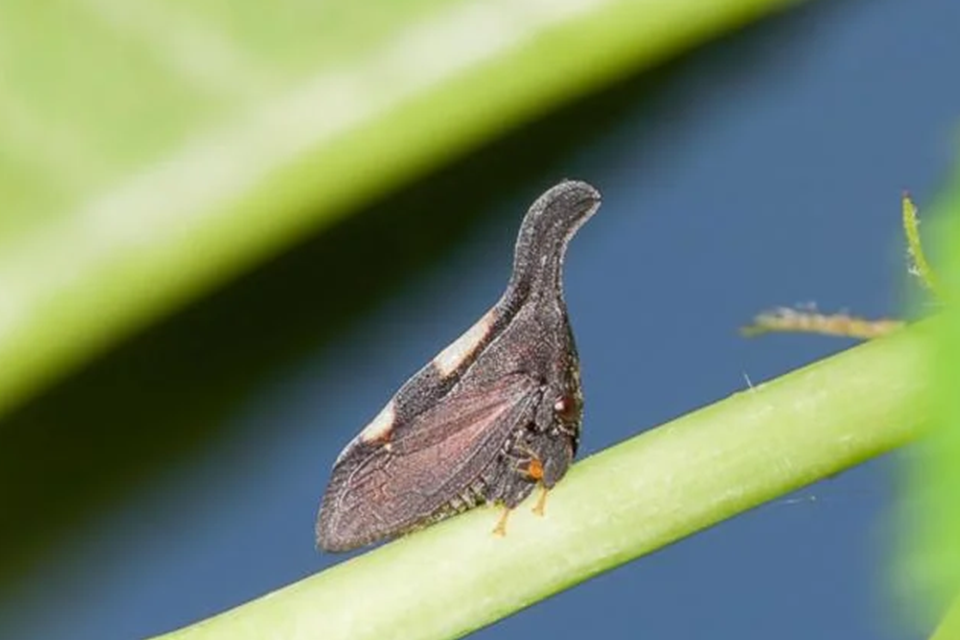SLU Study Shows Heat Can Cut Insect Survival but Boost Reproduction
Bridjes O'Neil
Communications Specialist
bridjes.oneil@slu.edu
314-282-5007
Reserved for members of the media.
ST. LOUIS — Rising global temperatures are changing the rules for survival—and reproduction—for many species. A new study from Saint Louis University reveals that predicting which species will persist under climate change is more complex than focusing solely on survival.
“Climate change is one of the greatest threats to biodiversity,” said Noah Leith, Ph.D., a researcher from SLU's Fowler-Finn Lab and first author of the study. “Most extinction models only consider survival, but reproduction plays an equally critical role—and conditions early in life can have lasting effects.”
Published in Ecology Letters, the study examined treehoppers—tiny insects that spend their entire lives on a single plant. Researchers found that warmer conditions during early development reduced survival but increased fertility later in life. These trade-offs could help some populations persist despite rising temperatures.
“If we ignore these early-life effects, we risk making inaccurate predictions about extinction,” Leith said. “Understanding these dynamics is key for conservation in a rapidly changing climate.”
Leith and the research team from the Fowler-Finn lab, including Kasey Fowler-Finn, Ph.D., professor of biology and lead author, explored how temperature influences insect behavior, reproduction, and survival.
Study Methods
Researchers studied Enchenopa binotata treehoppers, which live exclusively on the woody shrub Ptelea trifoliata. These insects overwinter as eggs inside plant stems, grow as juveniles in late spring, and mate as adults in summer—all on the same host plant. This unique life cycle allowed scientists to link controlled experiments to real-world temperature patterns.
The team collected wild juveniles in Missouri and raised them under two temperature conditions—21°C and 26°C—reflecting natural microclimates. They found that warmer developmental temperatures reduced juvenile survival but increased adult fertility. Even relatively small fertility boosts helped offset survival losses, potentially preventing population declines under moderate warming.
Key Findings
- Warmer juvenile temperatures increase mortality but boost adult fertility.
- These early-life effects may help protect insect populations from climate-driven declines.
- Predictive models must account for survival and reproduction across the entire life cycle.
Population models revealed that fertility benefits can expand the range of temperatures where populations grow—a “thermal niche,” meaning the temperature range in which a species can thrive—but only if survival losses remain moderate. Severe heat still narrows this range, limiting viability. Because treehoppers cannot regulate their body temperature, adapting to hotter conditions may require evolutionary changes in reproductive traits.
Researchers also found that when males and females developed under different temperatures, they didn’t mate as easily, but those that did transferred more sperm. This suggests a trade-off between mating success and sperm transfer, which could influence mate choice and even drive evolutionary changes over time.
Other study authors include Anthony Macchiano and Jake P. Woods, Department of Biology, Saint Louis University; Inaya Smith, Department of Biological Sciences, Harris-Stowe State University; and Brigitte Tenhumberg, School of Biological Sciences, University of Nebraska-Lincoln, Lincoln, Nebraska.
The study was funded by the National Science Foundation (grant number IOS -1656818)
About Saint Louis University
Founded in 1818, Saint Louis University is one of the nation’s oldest and most prestigious Catholic research institutions. Rooted in Jesuit values and its pioneering history as the first university west of the Mississippi River, SLU offers more than 13,300 students a rigorous, transformative education that challenges and prepares them to make the world a better place. As a nationally recognized leader in research and innovation, SLU is an R1 research university, advancing groundbreaking, life-changing discoveries that promote the greater good.


















